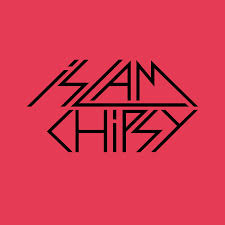Electricity is pretty powerful. Whether it’s in the form of currents or static, it’s fair to say we’re pretty reliant on it. Heck, you wouldn’t even be reading this review were it not for the flow of electrons circumventing into your screen of choice via a power socket.
And never has such an analogy been more appropriate than with Kahraba, an album that translates from Arabic as "electricity". It’s the long awaited jolt of lightning from EEK feat. Islam Chipsy we’ve been waiting an age for, since our appetites were whetted via last year’s bootleg live LP release, Live At The Cairo High Cinema Institute. Released on Egyptian/Algerian label Nashazphone, it was described in a review on tQ as "one of the best live albums ever".
EEK’s full-debut album sees the collective’s potential being brought in full force. For starters, there are four tracks rather than the two on the bootleg album. There’s also the opportunity for more musical variation to be displayed. But most importantly, we can truly see what EEK and Chipsy are made of when it comes to a studio environment. It’s all very well having raw talent on the streets of Cairo, but studio production is a whole other ball game altogether.
The band are a three-piece led by Islam Chipsy on keyboards, flanked by two drummers creating a sort of music that aesthetically, is derived from Chaabi. And yet paradoxically, isn’t. Thing is, Chipsy is part of an Egyptian continuum of classic traditional – albeit street – artists, with the band playing Egyptian standards such as the Northeastern Nile delta’s "Simsimiyya" on ‘El-Bawaba’ or Upper Egypt’s traditional "Mouled Saidi" on ‘Mouled El-Ghoul’.
And in spite of Islam’s links to the Electro Chaabi and Mahraganat scenes in Cairo via collaborations and friendships, it is something that musically, Chipsy is keen to distance himself from. If anything, EEK’s debut album is perhaps more reminiscent of a Public Enemy record from the late 80s: EQ’d, mixed, over-compressed to the max and mastered above appropriate decibels that would make it totally unfit for radio these days. Not to mention that tracks from neither Kahraba nor Fear Of A Black Planet would make it onto a Radio 1 playlist in the late evenings, much less daytime.
The album opens with ‘Trinity’ – a 10-minute opus of what’s to come for the next 40 or so minutes. It builds up with Chipsy’s key pushing before a wave of crashing, merciless drumbeats kicks in lurching the song into gear. From there it’s a mishmash of controlled angst and tight song craft. ‘Mouled El Ghoul’ has a slightly slower tempo, but there’s no letting up in the drums and keyboards being thumped in rapid-fire fashion, without sounding repetitive whatsoever. This ain’t Mawwal, that’s for sure. ‘El Bawaba’ is the shortest song on the record, but is by no means album filler or a mere afterthought. The pace is pretty frenetic, but is more in tune with the more traditional Egyptian stylings of their predecessors, rather than the more crossover appeal with modern day Cairo music. To finish up, ‘Kahraba’ will be familiar to those who have seen EEK live, most notably in the last year when he toured Europe. It follows the same formula as a standard Islam Chipsy composition: unrelenting, around ten minutes long and won’t let you rest for a breather.
It’s imperative to note that the drums on Kahraba are the backbone of the album. While taking nothing away from Chipsy’s virtuoso, world-class keyboard mashing, the percussion is what lingers in the mind long after you’ve finished listening. Much has to do with their respective talents on an individual level, but the fact these are justly mixed down to level pegging’s as the keyboard deserves high praise. As for Chipsy’s keyboard playing, Joost Heijthuijsen puts it best, writing on the Quietus last year: "Traditional piano players use all their fingers to play a chord. House music revolutionised this, by allowing the producer to use only one finger. Chipsy introduced a new approach: he fires tone clusters with his fists, palms and edges of his hands all over the keyboard, and slamming down the keys, but still in a virtuosic way."
There were worries that a slick, refined studio sound would take away some – if not all – of the excitement and rawness from the trio’s live shows. Thankfully, those fears have been allayed. On the contrary, while the spit-and-sawdust edge has been nullified, it has been replaced with a club – almost EDM sounding – quality, very much in congruence with pop music in 2015. Played over some half-decent speakers and cranked up, you’re bridled with a raw, lo-fi energy and gargantuan noise. And what a raw, lo-fi energy and gargantuan noise it is.
To first time listeners not used to time signatures, noise rock or Arabic music (without sounding insular), Kahraba might even be a culture shock. While a comparison was made with Public Enemy above in terms of production, they’re not in any way sound-alikes. EEK and Islam Chipsy are originals of their craft, which many in the West may not be ready for and will want to pigeonhole. But such attempts will be made in vain: the band – and Egyptians – couldn’t care less. In the most simple terms possible, there’s nothing else quite like these guys out there, anywhere.
<div class="fb-comments" data-href="http://thequietus.com/articles/18230-eek-feat-islam-chipsy-kahraba-review” data-width="550">


